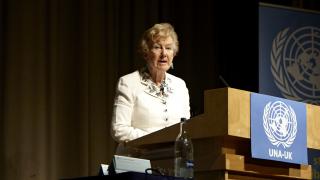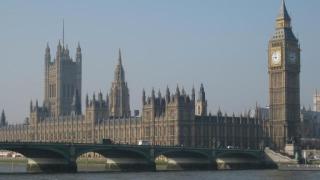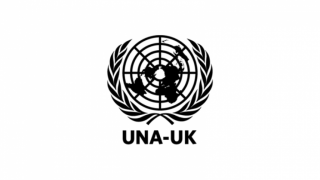
On 17 January 2017, family, friends and former colleagues gathered at St James's Church, Piccadilly, London, for a service of thanksgiving for the life of Dame Margaret Joan Anstee.
Dame Margaret, who passed away in August 2016, was a passionate internationalist, pioneer for women and leading light of the United Nations. She was a good friend and advisor to UNA-UK and continues to be an inspiration to us all.
The memorial included contributions from William Shawcross and Baroness O'Neill of Bengrave as well as messages from both the Presidents of Angola and Bolivia, expressing their gratitude for the work she did under UN auspices to further peace in both those countries.
A tribute delivered by Sir Jeremy Greenstock, which outlined not only her distinguished career, but also her courage and determination, has been reproduced below.
True pioneers are rare in our world. Dame Margaret Joan Anstee was a pioneer, no argument. She was a pioneer for women in international affairs, certainly, but the example she set for us all, men and women alike, in the determined handling of issues that cripple the development of emerging nations stands as a beacon of individual achievement in the history of the United Nations.
Margaret was born in 1926 in Chelmsford, Essex, and educated at Chelmsford County High School for Girls and Newnham College Cambridge.
She achieved a first in French and Spanish, starting her course three years before Cambridge admitted women to full degree status. She joined the Foreign Office in 1948, but when she married a fellow diplomat shortly afterwards her career had to be terminated because married women were barred from continuing as diplomats.
The loss for the Foreign Office turned into a gain for the United Nations, through the failure of that marriage in 1952 during her husband's Manila posting. Needing to earn money to pay for her passage back to the UK, she took a position locally with the UN office in the Philippines, and that led subsequently to a permanent career with the UN.
For the next 41 years Margaret covered an extraordinary range of positions in the UN, with a marked accent on field work. She served as Resident Representative of the UN Development Programme in eight different countries in Asia, Latin America and Africa. From 1974 to 1987 her departmental responsibilities in New York involved her in disaster relief operations in Bangladesh and Mexico, and in special assignments for the Secretary-General to help countries in dire economic distress, particularly Bolivia but also Peru. She was awarded Bolivian citizenship in 1990 and the country became her second home.
From 1987 to 1992 she served as Director-General of the UN Office in Vienna, covering social and humanitarian affairs and coordinating the UN's drug control programmes. Finally, from 1992 to 1993 she was appointed the Secretary-General's Special Representative in Angola. As she rose through these stages, she was the first woman to be appointed Resident Representative, Assistant Secretary-General, Under Secretary-General, and Special Representative of the SG heading a UN peacekeeping mission.
Those are the bare bones of a distinguished individual career. Let me try to give you a sense, often using Margaret's own words, of the colour of it all, the tensions, the disappointments, the victories, the courage and the determination of a woman who was just not going to concede that her gender was an impassable barrier to service of a high order.
She has written: 'In those early days it was a lonely, pioneering furrow to plough....The built-in prejudices and barriers to women were enormous. In 1956 the Resident Representative in Mexico rejected me as his deputy. Instead, I was sent temporarily to a regional conference in Colombia in an unsuccessful attempt to 'sell' me to another Resident Representative. But none wanted me when they discovered I could not take shorthand or type.' Her autobiography is, of course, titled 'Never Learn to Type'.
Left in charge of the Colombia operation for a year in the absence of others, she was chosen to head the UNDP's work in Uruguay when the Commission on the Status of Women complained about the lack of any female representatives.
She wrote in 2012: 'I was told I was a 'pilot project'. Still the only woman in such a role seven years later, I enquired whether I was the pilot light that failed. For many years there only two of us, and even today there are only 45 women resident representatives out of a total of 138.'
She goes on: 'It was impossible for a woman in that position to have a normal family or private life and she was very vulnerable. My budding career was nearly sabotaged by sexual harassment but there was no redress for such incidents: one had to fend for oneself. Moreover, women had to outperform men in order to succeed, and be ready to accept difficult and dangerous posts to demonstrate that their gender was not a drawback.
'Risk-taking - and by that I mean not only physical perils but, even more importantly, the willingness to accept professional challenges that might end in failure - had, and has, to be an integral part of a woman's career strategy if she is to reach the top. Later, when I was managing large departments in headquarters, I found that risk aversion was the main obstacle constraining able women I wished to promote, rooted in an unwarranted lack of confidence in their own abilities, a handicap signally absent in less-competent male colleagues.'
The risks were constant, but took a number of different shapes. Antonio Monteiro, her Portuguese colleague and friend from Angola onwards, told me:
'I will never forget Margaret's capacity to be herself in all circumstances, not giving in to setbacks and seeking to motivate positively other actors in the process. I remember a ceremony of demobilization of Unita and Government troops, already in preparation for the elections. That morning we left Luanda for the province of Moxico, a distant place, in the middle of the savannah. When I saw her on our way to the plane, she looked very elegant, as if we were going to Buckingham Palace. She presided at the demobilization ceremony on an improvised dusty stage, with her hat and shoes matching her yellow dress. At the end of the ceremony thousands of soldiers began to dance the traditional Angolan “kizomba” and unexpectedly she went down amongst them and danced. Of course we were surprised and somewhat concerned with her safety. This exemplified well her characteristic of an extremely active and courageous person.’
Another extraordinary episode occurred with the Angolan electoral campaign in full swing. Antonio Monteiro records:
'We were meeting with the Angolan parties in a city in the north of the country and suddenly very intense shooting begins at close range. Margaret, very calm and cool, whispered to me: “Antonio, it's time to talk to the television”. Then she went outside the building, called for the attention of the cameras and told them of the progress that was being made in the peace process and of her confidence, as the shooting grew ever closer, that the two main parties would come to an agreement. Her ability to adapt to circumstances, without undermining her convictions, was well demonstrated in the way she validated the election results, judging that the elections had in general been free and fair. She always tried to allow the defeated party to emerge dignified, to facilitate acceptance of the result.'
Her work in Angola, alas, was curtailed by the decision of UN headquarters to refuse to authorise a peacekeeping force there, when the crisis in Yugoslavia took priority. Such are the frustrations of an under-resourced and politicised organisation. Margaret worried that her position as a woman made her recommendations easier to set aside, but she had established a respect by then for the quality of her professionalism that makes that unlikely.
Margaret was a longstanding and passionate supporter of the work of the UN Association in the UK, and was the first winner of UNA-UK's annual Sir Brian Urquhart award for distinguished service. Standing in this spot should have been the Executive Director of UNA-UK, Natalie Samarasinghe [...]. Natalie wrote to Margaret on the occasion of her 90th birthday last June: 'I am deeply grateful to you for giving me the determination - not to mention advice and practical support - to follow a path in a world where women are still too often measured by their performance in the domestic sphere. You have broken so many barriers by doing what was needed, by doing it well, and by getting things done. You are definitely the UN's best pilot project, and the light that succeeded in blazing a trail for a life less ordinary.'
Let us remember Margaret Joan in that light, with her spirited stories circulating around the next generation of principled activists, an unforgettable figure of courage, colour and laughter, and a mould-breaker in the highest traditions of Britain's global reach.
Photo: Dame Margaret Anstee at the UN Forum 2012, organised by UNA-UK. Copyright UNA-UK






